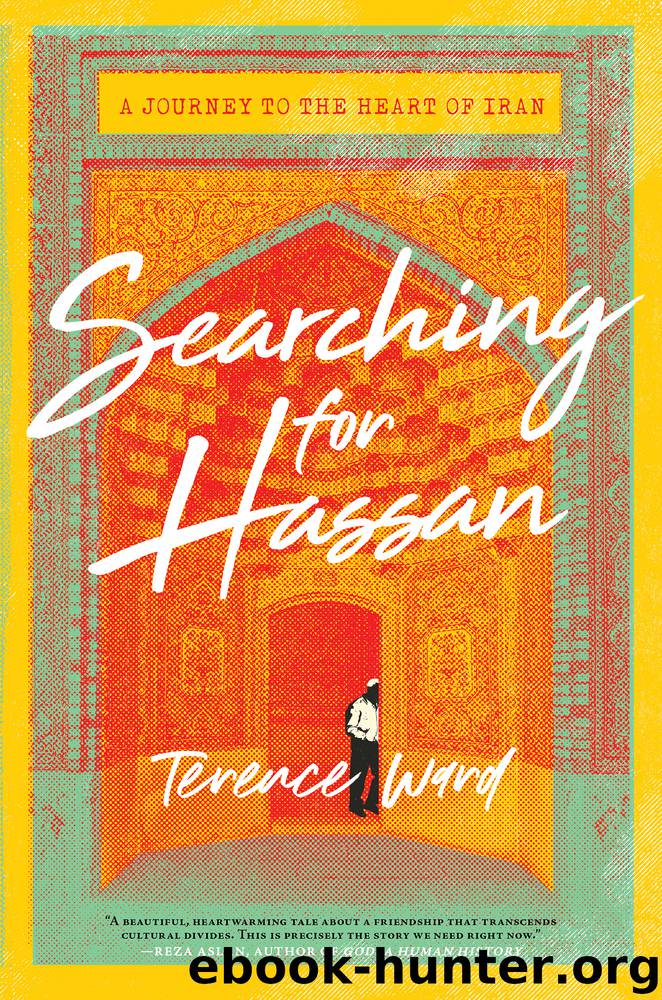Searching for Hassan by Terence Ward

Author:Terence Ward
Language: eng
Format: epub
Publisher: Tiller Press
Published: 2020-03-09T16:00:00+00:00
* * *
The words arabzadegi and gharbzadegi embodied the minefield of Iran’s identity. One needed a kind of Geiger counter to detect the trip wires, the booby traps, the explosive forces.
A friend of mine, a Berkeley graduate, passionately shed light on Akbar’s anti-Arab rhetoric, labeling many such arguments as simply conflicting emotions. Before I left New York, Mansur and I met for lunch in a Greek diner around the corner from Gramercy Park.
“What’s so great about pre-Islamic Persia?” he asked. “To be frank, it just doesn’t interest me.”
“Why not?” I asked.
“What’s there? Where is the literature? Nothing,” Mansur said. “They wrote in Aramaic, for God’s sake, not even Persian. Don’t forget, the Arabs gave us an alphabet. All these Iranians in America are lashing out at Islam, claiming it has no role in their Persia. What are they talking about? Look at the history—how can they be so stupid?”
“They speak of patriotism, nationalism,” I offered.
“Of course, Iranian intellectuals always go back to the pre-Islamic period. But if you’re denying great Arabic poetry, you’re an idiot. What’s so great about pre-Islamic Persia? Everyone speaks about it like it was a golden age. They’re full of baloney. They just want to hang on to everything Persian. But the Arabs brought a beautiful language and a faith and a world empire.
“Western scholars in love with Iran have fallen under the spell of Iranian nationalism. It’s stupid! Look what happened to Spain after the Muslims and the Jews were expelled. A disaster. And no one ever mentions that for the last two hundred years the best Iranian literature has come out of New Delhi and Lahore. Mixing is important, so is new blood. Tamerlane opened up roads to China, and so in came all sorts of goods. Everything that we are now has been borrowed from elsewhere.
“I don’t consider myself an Iranian,” he then announced. “Who cares who did what? I call myself a Middle Easterner. I’d like to see us unite culturally, like in times past.”
Discounting the hypernationalism of most Iranians, he dreamt of the golden epoch, between the eighth and ninth centuries, when the Abbasid caliphate ruled the civilized world from Baghdad, the city of The Thousand and One Nights that lay upstream from the old Sassanid Persian capital of Ctesiphon. The enlightened caliph Harun al-Rashid—Charlemagne’s counterpart in the Islamic world—and his son Mamun oversaw the birth of great centers for translation and the study of Greek, Syrian, Persian and Sanskrit literature. This cosmopolitan state, staffed with scribes, intellectuals, artists and scientists, fueled Islam’s brightest flame. This was a time when the acquisition of knowledge was one of the highest ideals of the tolerant world religion.
Download
This site does not store any files on its server. We only index and link to content provided by other sites. Please contact the content providers to delete copyright contents if any and email us, we'll remove relevant links or contents immediately.
| Arms Control | Diplomacy |
| Security | Trades & Tariffs |
| Treaties | African |
| Asian | Australian & Oceanian |
| Canadian | Caribbean & Latin American |
| European | Middle Eastern |
| Russian & Former Soviet Union |
The Secret History by Donna Tartt(19085)
The Social Justice Warrior Handbook by Lisa De Pasquale(12190)
Thirteen Reasons Why by Jay Asher(8909)
This Is How You Lose Her by Junot Diaz(6885)
Weapons of Math Destruction by Cathy O'Neil(6279)
Zero to One by Peter Thiel(5801)
Beartown by Fredrik Backman(5751)
The Myth of the Strong Leader by Archie Brown(5507)
The Fire Next Time by James Baldwin(5442)
How Democracies Die by Steven Levitsky & Daniel Ziblatt(5218)
Promise Me, Dad by Joe Biden(5153)
Stone's Rules by Roger Stone(5087)
A Higher Loyalty: Truth, Lies, and Leadership by James Comey(4960)
100 Deadly Skills by Clint Emerson(4924)
Rise and Kill First by Ronen Bergman(4788)
Secrecy World by Jake Bernstein(4752)
The David Icke Guide to the Global Conspiracy (and how to end it) by David Icke(4717)
The Farm by Tom Rob Smith(4507)
The Doomsday Machine by Daniel Ellsberg(4490)
